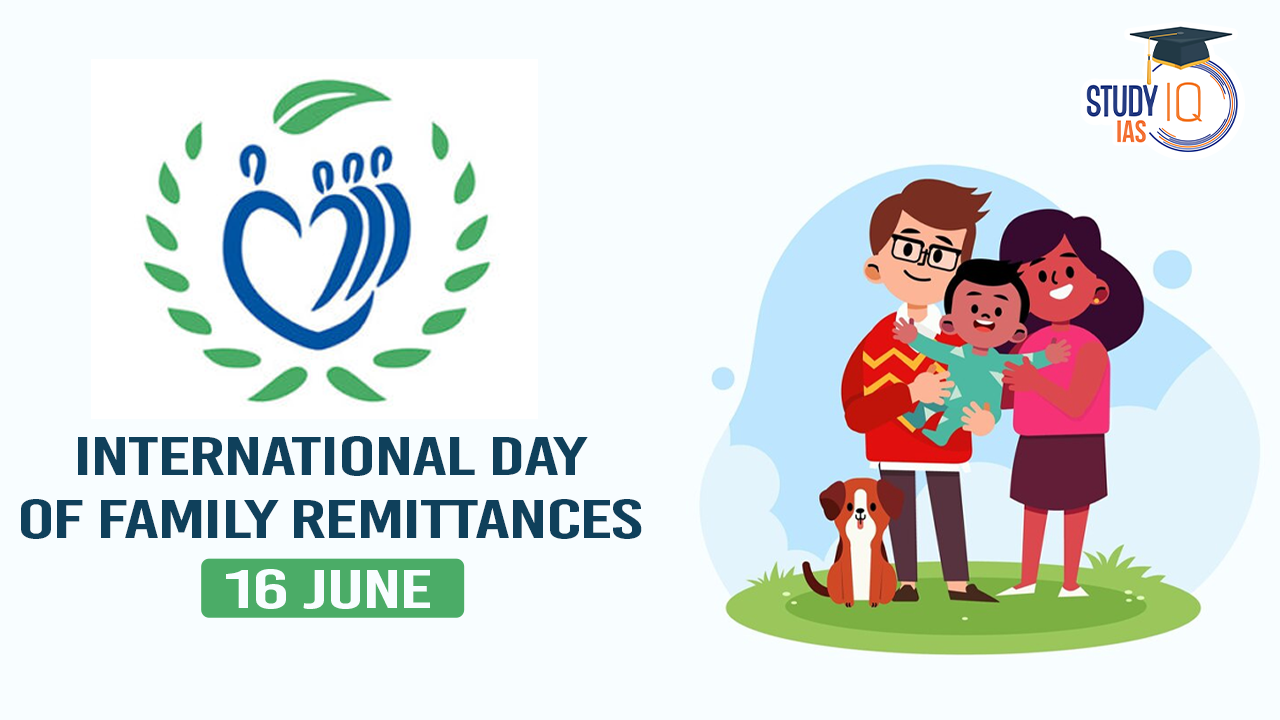Table of Contents
The International Day of Family Remittances (IDFR) is observed on June 16th each year. The United Nations General Assembly established it in June 2018 to recognize the contributions of migrants to their families and communities back home, particularly through the money they send as remittances. Check Out details on International Day of Family Remittances 2024 in this article.
International Day of Family Remittances 2024
International Day of Family Remittances 2024 is celebrated on June 16 to honor the generosity and sacrifices of migrants who help their families and communities back home. Remittances are funds sent from an individual or family member to another individual or household to meet the specific needs of the recipients. They are often the main source of income for families living in developing nations and slow-growing economies.
| International Day of Family Remittances 2024 Overview | |
|---|---|
| Date of Observance | June 16th, 2024 |
| Purpose | To recognize the contributions of over 200 million migrants who send money back home to support their families globally. |
| Acknowledged By | United Nations and various organizations worldwide. |
| Theme | “Digital remittances towards financial inclusion and cost reduction” |
| History | Part of the United Nations initiative to ensure safe and affordable money transfers globally. Remittance volumes have grown significantly in the last two decades. |
| Significance | Highlights the critical role of remittances in supporting approximately 800 million family members worldwide with essentials like food, healthcare, and education. |
International Day of Family Remittances 2024 Theme
This theme emphasizes the transformative impact of digitalization on remittance transfers. Digital remittances have the potential to make sending money safer, faster, and more affordable for migrants and their families. By leveraging digital platforms and technologies, financial inclusion can be enhanced, allowing more people, particularly in underserved areas, to access formal financial services.
International Day of Family Remittances History
The International Day of Family Remittances (IDFR) is observed annually on June 16th to recognize and celebrate the significant contributions of migrants who send money back to their families and communities in their home countries. Here’s a brief overview of the history and evolution of this important day:
- Origin: The IDFR was established by the International Fund for Agricultural Development (IFAD) and first observed in 2015. IFAD is a specialized agency of the United Nations that focuses on rural development and poverty reduction.
- UN Recognition: In June 2018, the United Nations General Assembly officially recognized June 16th as the International Day of Family Remittances. This recognition underscores the global importance of remittances in supporting families, communities, and economies worldwide.
International Day of Family Remittances Objectives
The objectives of the International Day of Family Remittances (IDFR) are multifaceted, aiming to raise awareness, advocate for policies, and recognize the significant contributions of migrants who send money back to their families. Here are the key objectives:
- Raise Awareness: Increase global understanding of the economic and social importance of family remittances.
- Recognize Contributions: Honor the efforts and sacrifices of over 200 million migrant workers who support their families through remittances.
- Promote Financial Inclusion: Advocate for policies that improve access to affordable and secure financial services for migrants and their families.
- Reduce Transaction Costs: Encourage measures to lower the costs associated with sending remittances across borders.
- Support Sustainable Development Goals (SDGs): Highlight how remittances contribute to achieving SDGs such as poverty reduction, health, education, and gender equality.
- Facilitate Partnerships: Foster collaboration among governments, organizations, and stakeholders to enhance the impact and efficiency of remittance flows.
- Empower Migrant Communities: Empower migrants by promoting their economic integration and participation in development activities in their home countries.
International Day of Family Remittances 2024 Celebration
| Activity | Description |
|---|---|
| Global Awareness Campaigns | Utilize social media (#FamilyRemittances) and distribute infographics to highlight remittance impacts. |
| Events and Conferences | Host virtual webinars and local cultural gatherings celebrating migrant contributions. |
| Policy Advocacy | Conduct roundtable discussions with policymakers and launch advocacy campaigns for reduced remittance costs. |
| Media and Publications | Publish feature articles and screen documentaries on migrant stories and remittance impacts. |
| Recognition and Awards | Honor individuals and organizations supporting migrant communities and improving remittance services. |
| Educational Initiatives | Integrate remittance education into school programs and develop online courses on financial literacy. |
| Community Engagement | Partner with NGOs for community events and engage businesses in CSR activities supporting migrants. |
| Digital Engagement | Create virtual exhibitions and facilitate online discussions on remittance-related topics. |
| Charity and Fundraising | Organize charity drives and encourage corporate fundraising for migrant welfare initiatives. |
International Day of Family Remittances Significance
The significance of the International Day of Family Remittances (IDFR) lies in its recognition and celebration of the profound impact that remittances have on individuals, families, and communities worldwide. Here are the key aspects of its significance:
- Provides a vital economic lifeline for millions of families in developing countries.
- Plays a crucial role in poverty alleviation and improving living standards.
- Promotes financial inclusion by encouraging access to formal financial services.
- Surpasses official development aid (ODA), contributing significantly to economic growth.
- Celebrates the human connection and sacrifices of migrant workers supporting their families.
- Directly contributes to achieving Sustainable Development Goals (SDGs) such as poverty reduction and improved health and education.
- Recognizes and honors the contributions of over 200 million migrant workers globally.
- Advocates for policies to reduce remittance costs, improve transfer mechanisms, and protect migrant rights.


 Asia’s Largest Tulip Garden
Asia’s Largest Tulip Garden
 World Happiness Report 2025, India's Ran...
World Happiness Report 2025, India's Ran...
 World Water Day 2025, Date, Theme, Histo...
World Water Day 2025, Date, Theme, Histo...





















